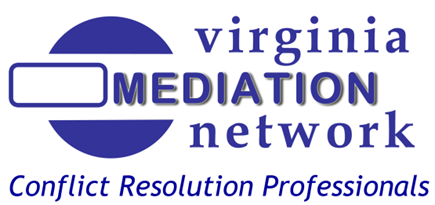The following post is authored by VMN member, Gina Weatherup, Founder and CEO of Chantilly Mediation and Facilitation.
“But I already tried to talk it out…”
On some Fridays, I serve as a mediator at my local courthouse for small claims cases. Recently I heard a very patient and reasonable judge voice something we hear quite frequently from parties to a dispute:
“You feel you’ve been wronged, and you’ve tried to settle. But the law doesn’t always follow your feelings. The mediators here can help you settle even when you think the other person is unreasonable.”
The same can be said for workplace disputes: People feel they’ve been wronged, but the formal complaints procedures followed by most HR departments don’t follow feelings. And, neither managers nor HR are ever truly neutral - there is always an interest in doing what’s best for the company or the department, and that can get in the way of mediation conversations.
About Neutrality
Ask any mediator, and they will tout being a neutral in a dispute.
I’ve been asked: Is anyone ever really neutral?
Given what we know about unconscious bias, it’s unlikely that most people are ever completely “neutral” - we navigate the world using assumptions about people because it makes our lives easier.
And yet.
There’s real value in bringing in a contracted mediator to discuss conflicts at work, precisely because, as contractors, we are assumed to have a different kind of neutrality to employees.
Contracted mediators have limited access to the world and culture in which the parties work. We have less knowledge about what’s going on - that includes procedures, policies, norms, gossip, and more. Everything you know about your workplace is a type of knowledge in which your contracted mediator will be limited! Our knowledge of the organization and of the conflict is limited to just what the parties tell us - and in some cases, what our client (often an HR leader or an executive in the company) tells us.
The lack of knowledge helps contract mediators provide a true outsider’s perspective.
None of the information shared can ever meet the level of knowledge that people working in the organization have. We don’t know or care what Sally in Accounting will say or what José in Client Services thinks. All of that is outside of ourselves and our work. It never even enters our mind, whereas an internal employee who is tasked with small-m-mediating can’t help but bring all of that other knowledge to bear on the situation - or has to work to actively ignore it.
Big-M-mediators - well, we’re just different. And we’re seen as different - and that “being seen as” may be precisely the type of neutrality required to help people in a protracted conflict come to agreement.
The Magic of Mediation
When you work with a trained mediator, you may experience a bit of magic.
We put together our training, our experiences, and our intuition - and we help people feel heard, validated, and able to move forward.
Yes, there are lots of tools at our disposal. Recently, a court mediation participant gushed about my use of tools:
“clear about expectations,” “generous in rephrasing,” “helped both parties to share” - and even said he was “impressed with clarity, brevity, neutrality.”
I am certain the judge would have been clear, brief, and neutral, as well as clear about expectations - plus the judge’s role is, in a sense, to help the parties. The judge will help the parties by ending the dispute through their decision about who is right and who is wrong.
But the judge’s role is different from a mediator.
The judge judges.
HR judges. They are required to, by their own role and responsibilities, always be evaluating. They need to decide whether a conflict might rise to the level of harassment, of legal discrimination, or something else that may merit a disciplinary action or some other company procedure.
Managers judge. They should be judging - they need to evaluate whether the person (or people) on their team is in need of more training, more coaching, more guidance, or some other help to work the job and achieve the goals of the department or organization.
As a mediator, my only role is to help people communicate with each other in trying to find a better path forward.
That is, itself, a kind of neutrality.
It’s more than that, though - it’s also a kind of magic.
Mediators develop intuition - or already come to the field with a felt, embodied knowledge of how people get along and how to help people make choices in difficult situations.
That’s why you come to a mediator.
You need that intuition, that magical mix of experience, tools, and a limited perspective.
That’s why, even when you’ve already tried to work it out, you may benefit from meeting with a mediator.
Even when you opt not to do a formal mediation, but you want some help in facilitating a conversation, we are happy to step in and help.
We love to work our magic for you!
****
From Gina: I founded Chantilly Mediation and Facilitation because we all spend too much time working to not be happy at work. Years ago, I was the person duplicating others’ work because I wanted to avoid the people I didn’t like. That approach is not sustainable - not for the individual and not for the organization. At CM&F, we save leaders time and money by resolving the conflicts they don’t have the time to deal with. We also train your leaders and employees on better ways to approach conflict themselves, improving overall productivity and increasing happiness at work.
See testimonials from clients: https://www.chantillymediationandfacilitation.com/testimonials
